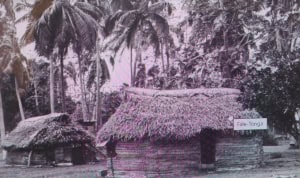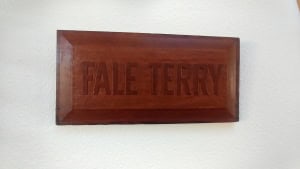A Peace Corps Experience- An Interview with Creed Terry
by Joni Johnson
What do you need to do to work for another country’s minister of finance, create your own job and live in a house made of fronds in a tropical paradise? Clearly, the answer is join the Peace Corps. And this is exactly what Creed Terry did in 1969.

Creed Terry
Creed went to the University of New Hampshire for a BS in Business and then to Columbia for an MBA. Interested in travel and stretching his experiences before seriously settling down, he applied for a stint with the Peace Corps somewhere in Asia. While waiting for his acceptance, he started working for Lever Brothers. Seven months later, Creed was offered the position of Special Assistant to the Minister of Finance in Tonga. At the time, this type of position was rarely an option. In the early years of the Peace Corps most people were assigned to jobs in teaching, agricultural support and engineering. So acting as an assistant to a minister was really something new. And Creed wasn’t exactly sure what this all entailed.
Typically, at that time, training lasted three months. Two thirds took place in the United States and the last third was in the actual destination country. So Creed spent his first two months in Molokai, Hawaii, getting used to a more tropical climate and agricultural based society. Molokai, at that time, was an island of wooden sidewalks and places to tie up your horses. However, Creed said that he rarely got a chance to get out and know the people because training was all consuming. There was education about Tonga and its people and the cultural differences between the US and Tonga. This included gardening and poultry raising. However, at least 80 % was language instruction in the native language of Tonga, largely taught visually and auditorily rather than the more typical instruction of the day which would have included lots of grammar and written exercises. His education continued in much the same way when he finally got to the Kingdom of Tonga.
The Kingdom of Tonga was a British protectorate from 1900 until 1970. In 1970, just a year after Creed arrived, it became an independent and sovereign nation. While Creed did not meet the queen, he got within spitting distance. He was the only volunteer, because of his association with the Minister of Finance, who attended the royal feast in her honor on the palace grounds in Nuku’alofa. They served 400 roasted pigs as part of the celebration.

Royal Palace. The lawn in front of the palace was site of the independence feast.
Tongans, a Polynesian group with a very small mixture of Melanesian, represent more than 98% of the inhabitants. The rest are European, mixed European, and other Pacific Islanders. There also are about 500 Chinese. More than two-thirds of the population of the Kingdom of Tonga live on its main island, Tongatapu. And that is where Creed was sent for his third month of training. The Kingdom of Tonga is the only Pacific nation never to fully lose its indigenous governance. Also known as “The Friendly Islands,” it consists of 171 coral and volcanic islands spread over 171 islands with a total land surface of 288 square miles. Forty eight of those islands are inhabited. It lies south of Samoa, east of Fiji, and just north of the Tropic of Capricorn. The country’s name comes from the Tongan word for “south.”

Tongan Fale
After training, Creed moved to his final home in Tonga in a small village very close to the capital of Nuku’alofa. There, he created his garden plot and started raising chickens. His “fale,” which is the Tongan word for house, was small and cozy. His home was 10 by 20 feet, and covered with palm fronds. The structure included a kitchen, dining room and bedrooms. All the Peace Corps volunteers were given bicycles, and that is how Creed traveled for much of his time on the island. So his first day at work, he bicycled to the Treasury to meet the Minister of Finance who had wanted help from the Peace Corps. However, he really didn’t have any idea of how to use Creed’s skills, and so magically, it was left to Creed to develop his own job. Over the course of two years, Creed developed and accomplished 21 projects which had to do with an analysis of public finances, a number of projects to analyze and increase tourism in the country, and development of credit unions in the country. In addition, he gave lectures on the Tongan economy to agricultural students, and he also taught accounting twice a week at the local high school. Plus, he needed to keep his garden well-tended and his poultry well fed and periodically slaughtered and cooked. In fact, Creed said that one thing he realized from his experience in the Peace Corps is that he learned how to be largely self-sufficient and comfortable should survival ever become an issue. And in addition, due to the projects he had developed, he made full use of his expertise in dealing with people to make sure these projects came to fruition. He compared it to dropping a pebble in the water and watching the ripples. He said the experience taught him to see the big picture as well as everyone involved in the picture. Things didn’t work unless people were on board. That meant the police, the customs officials, other ministers etc.

Carving by Creed’s Dad. It has hung on the wall in every home since 1969 including here at RVM
Creed, like so many other Peace Corps Volunteers, feels that his time in the Kingdom of Tonga was a life-changing event. He considers his growth there in terms of personal experiences was immeasurable. Just getting to know another culture in such depth was wonderful. And he feels the cross-cultural communication was also appreciated by the Tongans themselves. He is unclear how many of the projects continued after he left. But his successor (a native Tongan) did call to ask for advice and certainly his efforts in tourism have continued to this day.


Malo e lelei, Creed. My cousin Lise is married to a Tongan, Rodney Sekona. His family owns a construction company based in Salt Lake City. You probably can guess what the focus of their business is – building coral block walls. Lise’s speciality is producing lots of grandchildren, five at last count. Faasamoa.